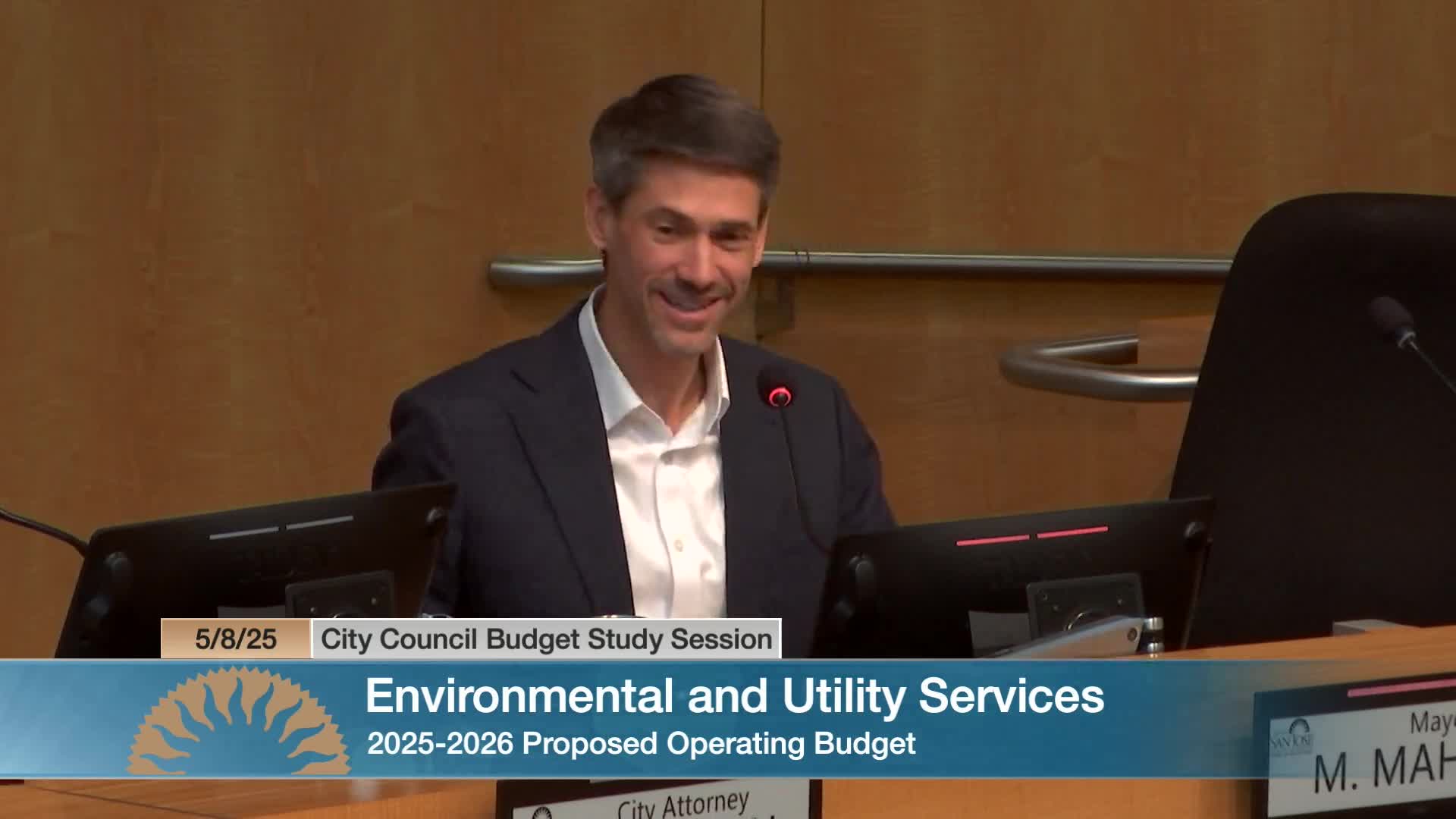San Jose study session spotlights stormwater permit push, biosolids dewatering and recycling gains
Get AI-powered insights, summaries, and transcripts
Subscribe
Summary
City environmental and utility officials briefed the City Council on May 8 about stormwater permit implementation, biosolids processing changes at the regional wastewater facility, and progress lowering recycling contamination that staff said will save the city millions.
City environmental and utility officials briefed the City Council on May 8 about stormwater permit implementation, biosolids processing changes at the regional wastewater facility, and progress lowering recycling contamination that staff said will save the city millions.
Jeff Provanzano, deputy director of Environmental Services, and Laurie Mitchell, director of energy, presented an overview of the Environmental and Utility Services CSA and the department dashboards. Mariana Chavez, general manager of the Regional Wastewater Facility, and Valerie Osmond, deputy director of waste management, answered council questions about biosolids energy recovery and diversion trends.
Why it matters: stormwater permit compliance carries regulatory deadlines and potential costs; changing biosolids processing affects operating costs and timing at the wastewater facility; recycling contamination affects municipal hauling costs and landfill diversion targets.
Stormwater and trash capture: staff said San Jose is close to meeting a required 100% street‑level trash load reduction for the stormwater permit. Jeff Provanzano described a combination of “small” inlet‑level trash capture devices and larger below‑ground units installed across the city. He reported the program is around 97% complete and that staff expect to finish outstanding installations and gap analyses before the December 2025 deadline.
Provanzano said the department is coordinating with Public Works on device siting and with code and enforcement programs that notify private property owners about visible trash. Councilmember Campos asked whether a recent U.S. Supreme Court decision affects the city's permit obligations; staff said the local stormwater permit is a state‑issued permit and that the Supreme Court decision cited by the council member “doesn't necessarily impact our stormwater permit.”
Biosolids dewatering and energy: Jeff Provanzano and Mariana Chavez told the council the utility will commission a mechanical dewatering facility this fall. Provanzano said the city will operate two biosolids systems in parallel during a four‑year transition while it clears solar drying beds; staff expect operational savings after the transition. Mariana Chavez described existing on‑site digestion and cogeneration: “80% of the energy that they use at the RWTF is actually coming from renewable sources,” she said, and staff are planning to accept additional feedstocks, including fat, oil and grease, and potentially food waste for co‑digestion to produce more renewable energy.
Recycling contamination and cost savings: Valerie Osmond described a neighborhood outreach and ‘recycling ambassador’ program that tags carts and performs “Oops!/Good Job!” field outreach. She said the effort reduced recycling contamination from about 50% to 41% and that the city will save about $6,000,000 annually in avoided processing costs as a result.
Energy and power mix: Laurie Mitchell explained a recent dip and projected rebound in San Jose Clean Energy’s carbon‑free power mix. Staff attributed a prior decline to a regulatory allocation change related to Diablo Canyon nuclear plant output, and said the department has executed new power purchase agreements and long‑term renewable projects that should raise renewable content next year.
Recycled water and customers: staff reported average recycled water delivery around 12 million gallons per day and said capacity could roughly double if additional users — especially data centers — commit to using more recycled water. Councilmember Salas asked whether the city is at capacity; staff said additional customers can be added and that staff are working with regional partners.
What’s next: staff said they will continue permit implementation work, complete commissioning of the mechanical dewatering facility this fall, pursue additional feedstocks for co‑digestion, and track diversion and reuse programs. Councilors asked for follow‑ups on the stormwater expenditure plan, the legal implications of permit timelines, and the staffing realignment that underpins some of the environmental budget reductions.
